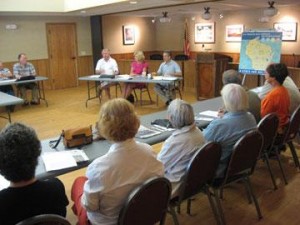A Way to Learn
- Share
- Tweet
- Pin
- Share
As endless tourists rushed over bridges Saturday, July 11 to fuel the economic engine of Door County, one visitor was less typical. While many came to see the county’s beauty, U.S. Sen. Russ Feingold came to listen.
Feingold sat in the front of the Sevastopol Town Hall, holding one of the 72 listening sessions he holds annually in each of Wisconsin’s 72 counties. Feingold describes them as “a way to learn what people are thinking.”
“I don’t get into that Washington thinking, because I’m always hearing from Wisconsin first,” he said.
On Saturday, about 50 Door County residents showed up to ask questions of their senator. The topics ranged from broad issues like health care to specific votes. Here are Senator Feingold’s main points on each:
On health care:
• “Health care is not a Constitutional right, but it should be made a law.”
• “There is an exceptional public activism in terms of real health care change…don’t let up.”
• “This nation has got to stop the process of leaving people hanging on health care.”
• “Yes, government can screw things up. We know that.”
On Social Security:
• “Either the FICA limit should be taken off completely or raised substantially, maybe to what members of Congress pay.”
On campaign finance reform:
• “I made a pledge to get the majority of my campaign contributions from Wisconsin, and my average contribution was very low.”
• “I still think we should have public financing on all campaigns.”
On the cap-and-trade energy bill:
• “I would be surprised if it came up this year in the Senate.”
• “I believe in anti-global warming legislation. I am not going to vote for something, though, that is incredibly unfair to Wisconsin.”
On the war in Afghanistan:
• “I supported the Afghanistan invasion; I opposed the Iraq war.”
• “Long ago, this started to be perceived as an occupation by the Afghan people.”
• “I don’t like the troop buildup. General Stanley McChrystal said today that it’s going to take a lot more Afghan troops and therefore a lot more American troops to do what President Obama wants to do. Well, I think you better figure out something else to do, because I think this is not going to work.”
On North Korea:
• “The North Korean situation is really rough, because obviously we’re concerned about Iran, as we should be, but [the Iranians] are not actually irrational. They may have irrational goals, and you may not like them, but they’re rational. These folks are not rational, the North Koreans.”
On veterans health care:
• Feingold proposed that all veterans receive a baseline health evaluation as soon as they return home, so it can be determined later which health problems were caused by the war.
On allegations that the CIA misled Congress in the run-up to the Iraq War:
• “I can’t tell you the details, but I can tell you this: I can guarantee you that the CIA misled this country.”
On a law that would allow people to carry firearms in national parks:
• “You might be mad at me, but I’m not really against it. I don’t see it as inherently a problem.”
• “I am a person who believes in the individual right to bear arms. That’s always been my position.”
On political activism:
• “I get a sheet every day that tells me how many people have called my office on various topics. It’s not very many.”
• “I think people are under-utilizing their ability to make politicians feel the heat.”
Feingold spent a little over an hour at the session, and said the most pressing issues in Wisconsin right now are job loss, especially in the auto industry, the need for health care reform, and the need to stimulate the economy.
“I’ve never seen a time when there’s more things happening at once,” he said. “Usually we’ve got two or three big things, now we’ve got seven or eight. That’s the hardest thing, trying to balance all those. I’m just working as hard as I can to try to keep all these balls in the air, and following the president’s lead on what we should do and when we should do it.”
At the end of the day, the Senator got back in his government van and drove back over the bridge, like countless others. Also like countless others, he left Door County to return to work. But unlike most of the county’s visitors, Feingold had been working during his stay, and because of his efforts, Door County and Washington, D.C. are just a little more connected.

